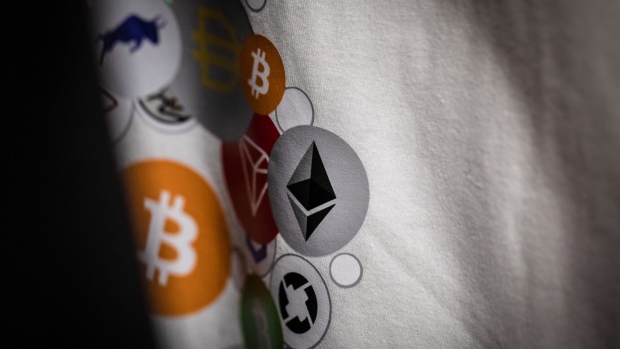Feb 26, 2024
Genesis Faces Unlikely Bankruptcy Foe: Its Own Parent Company
, Bloomberg News

(Bloomberg) -- Bankrupt crypto lender Genesis Global Capital is facing an unexpected opponent as it seeks court approval on its proposal for distributing billions of dollars in assets to creditors: its own corporate parent, Barry Silbert’s Digital Currency Group.
Genesis and DCG are set to duel Monday in a White Plains, NY, courtroom over the bankrupt subsidiary’s plan for repaying creditors whose digital assets and cash have been frozen on the platform since November 2022 following the collapse of several large crypto firms.
At stake is the amount Genesis creditors will be repaid. Genesis, which is being run by independent advisers in Chapter 11, has estimated creditors who lent it digital assets could recover as much as 77% of what they’re owed if its plan wins court approval but less if DCG wins. Creditors include high net-worth clients who lent crypto to Genesis, as well as customers of Gemini Earn, a lending program it ran jointly with the billionaire Winklevoss brothers’ Gemini Trust Co.
The bankruptcy wasn’t supposed to end this way. Soon after Genesis filed Chapter 11 in January 2023, the company struck a restructuring deal with DCG, Gemini and its major creditors that could have ended the bankruptcy within months. But that deal fell apart and subsequent proposals also faltered.
Genesis abandoned a possible restructuring after state and federal regulators sued the lender, its parent and Gemini, accusing the companies of defrauding Earn customers and alleging the now-terminated lending program amounted to an offering of unregistered securities. The companies also sued each other: Genesis sued DCG to recover loans and Gemini accused DCG of fraud in its own lawsuit.
Impermissible windfall
DCG, Genesis and Gemini have denied wrongdoing. DCG has also said it repaid its short-term obligations to Genesis and that Gemini’s claims are false. Genesis has settled government lawsuits over the Earn program ahead of Monday’s hearing.
Genesis charted a different path and rallied creditor support for a liquidation that, if approved, would use a novel method to distribute digital assets that have increased in value. DCG opposes the plan, saying it favors Genesis creditors being fully repaid but argues the proposal would give some creditors an impermissible windfall while stripping the parent company of economic and governance rights.
DCG is arguing the value of Genesis creditors’ claims must be set based upon where crypto prices stood at the time its subsidiary filed bankruptcy in early 2023. At the time, Bitcoin was trading around $24,000, which is less than half its current price as of Friday.
Bankruptcy rules generally require valuing creditor claims at the time a company files Chapter 11. Doing so protects creditors in the event a troubled companies’ assets lose value in bankruptcy. The rule usually isn’t a problem for creditors of bankrupt companies because claims are paid in cash and additional government regulations exist to protect customers of failed brokerages firms and banks.
But the rule is a problem for creditors of bankrupt crypto firms because the industry lacks the same regulations and digital assets are volatile. That means customers of bankrupt crypto platforms could miss out on the substantial increase in Bitcoin or Ethereum.
More Value
DCG has said every other crypto bankruptcy has used the same methodology prescribed by the bankruptcy code and cited a Delaware judge who ruled last month that the size of FTX customer claims will be set based on what customers were owed on the day Sam Bankman-Fried’s firm filed bankruptcy in November 2022.
Genesis creditors have said if DCG prevails they’d get back substantially less crypto than they loaned its subsidiary.
Bradley Geer, a Houlihan Lokey Inc. managing director advising Genesis creditors, said in a sworn statement that DCG is arguing “it should be entitled to what is essentially a dividend on its equity while the Debtors’ crypto-denominated customers are left recovering only a fraction of the coin quantity that they lent to the Debtors.”
Genesis, with creditor support, has said its plan is meant to repay customers as much as possible. The proposal would use crypto pricing at the time it filed Chapter 11 to determine how its digital assets are allocated among creditors. The lender doesn’t have enough Bitcoin or Ethereum to fully repay customers in those tokens, but has proposed additional steps to return more value.
Genesis doesn’t have tokens like Bitcoin or Ethereum to fully repay creditors back in the type of digital asset they lent the company. However, the proposal under consideration is meant to repay clients as much as possible in the type of token they lent Genesis before it filed bankruptcy, the company said in court papers.
Judge Sean Lane will determine if Genesis’ proposal is authorized by the bankruptcy code. Monday’s trial is expected to run for at least a few days.
The case is Genesis Global Holdco, LLC, 23-10063, US Bankruptcy Court, Southern District of New York (Manhattan).
©2024 Bloomberg L.P.





